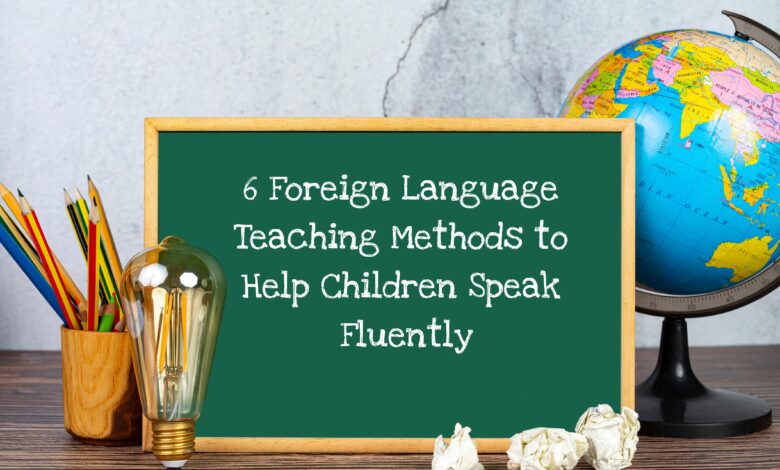6 Foreign Language Teaching Methods to Help Children Speak Fluently

When it comes to foreign language instruction in primary school, it indicates that classes alone are insufficient; if the child has no more interaction with the language after school, everything they have learned will quickly fade away. This holds for all academic topics, but especially for foreign languages.
So, encourage your child to use the words they learn outside of the classroom as often as possible because using a language is the most incredible way to acquire it. The following are methods you can use for your child to speak fluently:
1. Playing games in a foreign language
Children learn about their environment in a natural way when they are young, through ordinary activities. However, their favorite pastime – play – is one of the best and most efficient ways to learn.
Learning a foreign language through play is a tried and true means. Playing hide-and-seek with youngsters, for example, might be a fun method to teach them how to count in that language. Furthermore, the employment of instructional technology produces remarkable outcomes in the early learning of foreign languages.
You may find a variety of fun games and apps online, such as interactive puzzles, to assist your youngster in learning the names of colors, animals, and shapes in several languages. Apart from learning new words in a foreign language, the child will also gain valuable world knowledge in this manner.
2. Singing songs in a foreign language
Children enjoy songs, and the music helps them retain a large number of words, making songs an excellent memorizing and learning tool. Singing songs in the target language is not only a terrific way to help your child learn a foreign language, but it’s also an excellent way for you to spend time together and have fun. Search YouTube for children’s songs that your youngster might enjoy, and don’t be afraid to sing along. Your child will memorize the song by heart before you realize it.
3. Reading books in a foreign language
In bookstores, you’ll find a variety of specialist books for learning foreign languages from an early age. Your child will quickly master the meaning and pronunciation of foreign words with your assistance in reading, writing, and word meaning. Simple bedtime stories can even be read in a foreign language. Common phrases are generally included in such stories so that the youngster can readily recall them.
4. Incorporate learning a foreign language into your daily routine
Children absorb everything like sponges in early life; therefore, no specific learning aids are required. Go to a park, a store, or a playroom and play a game where you first name the things, shapes, and colors you see in your native language, then in the target language. This is the most effective way for a youngster to learn target language words. They will correlate them with objects and phenomena in their environment, allowing them to apply them when necessary.
The youngster will unintentionally strengthen their native language while learning the other language in this method.
5. Learn a foreign language online
Adopting a language less formally if your child has a second language at school is a nice respite from courses, as well as a desirable and successful learning approach. Online language courses are entertaining and easily accessible, so it’s a convenient way for your child to improve their language skills.
The beautiful thing about learning a foreign language online is that it fits right into a child’s schedule: sessions are brief and contain assessments, which children can complete on their phones while doing other things. These websites and apps are jam-packed with intriguing and entertaining activities for kids that will keep their attention considerably longer than traditional lessons.
6. Play children’s shows and cartoons in a foreign language
When studying a foreign language, keep in mind a significant distinction between language exposure and language learning.
We usually imply memorizing grammar rules, words, and drills when we talk about language acquisition. However, the most crucial element for young children is to be introduced to a language’s sounds, rhythm, and melody. Playing cartoons and children’s shows is one of the best ways.
Children learn to speak at a young age through listening, repeating, and linking words with specific actions. This is why many kids can learn a foreign language just by watching cartoons in that language.
Many cartoons and TV series gear toward language learning, with youngsters learning the meaning and pronunciation of words through the adventures of cartoon heroes.
The impact of early exposure to a foreign language on your child is also significant. It will make their pronunciation sound similar to, if not identical to, that of a native speaker.
Simply said, children are excellent imitators and quickly pick up new skills, including pronunciation, whereas older students almost usually keep their native accent.
Bottomline
Learning a foreign language broadens our views, exposes us to different cultures, and serves as an effective tool in our personal and professional development. Parents, like schools, play a vital role in this process. We hope that the suggestions in this article will assist you in making foreign languages more accessible to your youngsters.





